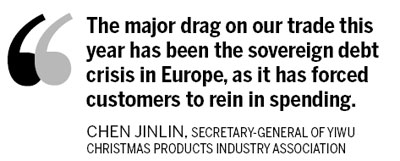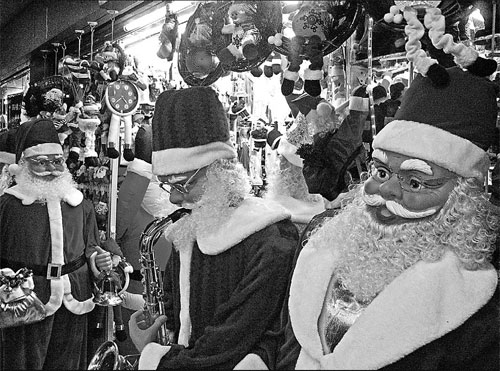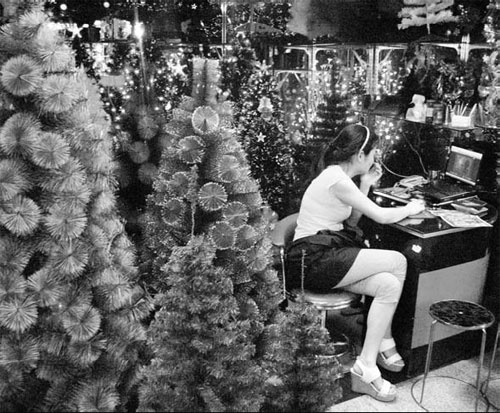Winds of change blowing through Yiwu
|
Yiwu in Zhejiang province has been a major supplier of Christmas products for Europe. Affected by the ongoing economic downturn in Europe, local companies are making moves to survive. Lin Jing / China Daily |
|
An owner of a company waiting for customers at her shop. Lin Jing / China Daily |
Lean times prompt entrepreneurs to develop new strategies to keep afloat
Though winter is still a good two months away, icy winds from Europe seem to be already buffeting the low-cost manufacturing hub of Yiwu, in East China's Zhejiang province. The all-round chill, however, has little to do with the actual weather in the city lying southwest of the Yangtze River Delta, but more to do with the bleak export landscape and tepid demand from overseas markets.
"You can find virtually anything you could see or imagine on the earth in Yiwu" is often the catchphrase used by experts to explain the city. The bleak situation has, however, put the city on a fast-forward mode to find ways and means to combat the crisis.
With a market area of 4.7 million square meters and more than 1.7 million kinds of products, it is a veritable hub for traders from across the world. Last year total exports from Yiwu were in excess of $3.6 billion, an increase of 26 percent over 2010.
Small commodity hub
Yiwu is also a major hub for Christmas products and has more than 700 companies with annual returns of more than 2 billion yuan ($316 million) engaged in the trade. The trade covers more than 15,000 categories and includes Christmas trees, toys and decorations, according to statistics provided by the Yiwu Christmas Products Industry Association, or YCPIA.
Christmas products exported from the city account for more than 50 percent of the total sales in the world market, compared with 70 percent in the United States and 40 percent in Europe.
But the prospects this year are not that encouraging.
"Total sales for this year are likely to fall by 15 percent to 20 percent, compared with 2011," said Chen Jinlin, secretary-general of the YCPIA.
"The major drag on our trade this year has been the sovereign debt crisis in Europe, as it has forced customers to rein in spending. Surplus inventories from last year have also affected new orders," he said.
There has also been a steady rise in new companies. The number of companies in Yiwu grew from about 400 in 2010 to 500 in 2011 and to more than 700 this year. Chen said that the fast expansion of local companies has splintered the limited market share.
In Futian No 2 market district of Yiwu city, there are more than 400 companies specializing in Christmas products. It is also known as "Christmas village" among local people.
Normally, business orders from Europe and the US ramp up between March and July. Buyers from the Middle East show up in this village between May and September. By the end of August, most of the companies are already busy with packaging and delivery.
Demanding customers
The drop in orders this year has brought about some changes to business in Yiwu.
He Huaming, 53, owner of Yiwu Shenghua Handicraft Product Co, said that this year most of the clients have higher requirements for packaging.
"This year they ask for better and more exquisite packaging to attract consumers in their countries," He said.
The company makes decorations such as balls and bells for Christmas trees. He said that some old clients did not show up this year, while others just cut their budget by about one-third even as products with lower price tags notched better sales. "For instance, previously we had a box with six balls. But now clients prefer smaller packs with four balls. Some others choose to buy a box with six smaller balls."
Lu Xiaofeng, owner of Yiwu Xibao Crafts Factory, said he will see a 20-30 percent dip in overall sales at his company this year.
The company mainly produces Christmas trees and 80 percent of its products are exported to South America and the balance sold in the domestic markets.
The bestsellers are Christmas trees that are 1.5 to 1.8 meters tall, mainly for home use. He said that due to the European debt crisis, low-end trees are now more in demand.
There are two types of trees in his store: luxurious and normal. The first type includes many entertaining functions, such as more flashing lights. With environment-friendly materials, these trees are priced at about 300 yuan to 500 yuan.
The normal tree costs about 30 yuan and is made of cheaper materials. The brightness of the trees is also different.
"Christmas trees for foreigners are like lanterns for the Chinese during Spring Festival. With a tight budget, it is obvious that clients will go for the cheaper ones."
Rising labor costs are another burden that companies are grappling with. Labor costs increased by 30 percent last year and raw material costs by 20 percent.
"A 10 percent annual salary increase is a must for us to retain talent," said Lu.
His company pays 2.2 million yuan in salaries to 40 workers every year, accounting for 30 percent of the total costs.
Lu said that the company is under great pressure, with rising labor costs and reduced orders. All he can do is to try to get more orders and come up with better marketing practices to tide over the situation.
Innovation strategy
But on the other hand, the tight conditions have also prompted some companies to focus more on developing new products. "Only new products can attract more clients," said Lu Jianzhi, owner of Yongtai Decoration Co.
Set up in 2006, the company makes color ribbons and posted sales of 20 million yuan last year, 80 percent of which came from Russia and the Middle East.
Every year the company launches more than 50 kinds of new products. Last year it made a flower-like ribbon called "laser flower". This year it plans to make colored ribbons in green, white and yellow.
"Clients always come in for new things and new design. They need to attract their consumers as well," said Lu, adding that the profit margin may even triple for new products.
He from Shenghua said that his company will continue to explore new markets to maintain steady growth.
Refusing to divulge the exact numbers, He said that a 30 percent dip in sales is expected this year.
The company is trying to develop the Russian market, which has contributed steady growth of 10 percent. "Had it not been for the Russian market, we would have ended up with our overall sales dipping by over 50 percent," he said.
Due to the rising costs and fewer orders, the company wanted to hike prices by 3 percent. But most of the clients refused the price hike and instead asked for more cuts.
He said that in the future he will have to explore more markets in South America and Eastern Europe to avoid the risk of depending too much on one area.
With such a bleak scenario, some companies have also creatively decided to sell their ideas, instead of only selling products.
Yiwu Youlide Arts & Crafts Co Ltd mainly produces Christmas trees and decorations. It is now trying to provide products in sets, which consist of a Christmas tree, a Santa Claus and decorations such as ribbons, balls and bells.
"The price of a set will be higher than each of them added up, because we will design and provide product display services. Clients are willing to take it, if we have a better idea," said Mei Lin, export manager of Youlide.
The company has built a four-floor exhibition center with each hall covering 3,000 square meters in Qingkou, a town, about 6 kilometers east of downtown Yiwu. Instead of simply putting products on shelves, the displays have a theme, like a shopping mall or supermarket.
"We believe that it will bring a fresh visual effect and new ideas to our clients and help with sales by presenting products in sets, instead of single items."
To cope with the rising costs, Mei said that the company will reduce management and operation expenses.
"But the most important thing," said Mei, "is to explore more clients overseas, especially in South America and Russia, by running ecommerce on B2C platforms and websites, and participating in more international exhibitions."
Mei said that the company has attended international exhibitions such as the annual Christmas World-an exhibition for worldwide suppliers in Frankfurt- in 2012 and a trade show in Hong Kong.
"We can learn the design and pricing method from other companies at these exhibitions. Besides, we can meet more distributors and retailers directly, which helps us gain higher profits."
Last month, a delegation from the Santa Claus Foundation in Finland visited Yiwu, looking for business partners for Christmas and Santa Claus products.
Chen, secretary-general of YCPIA, had a three-hour meeting with them, and discussed a plan to export Yiwu's products to Finland for further packaging and then export them to other Western countries. He said that the project is still in the research stage and will be implemented soon.
Contact the writers at linjingcd@chinadaily.com.cn and zhangjianming@chinadaily.com.cn

(China Daily 09/22/2012 page10)














